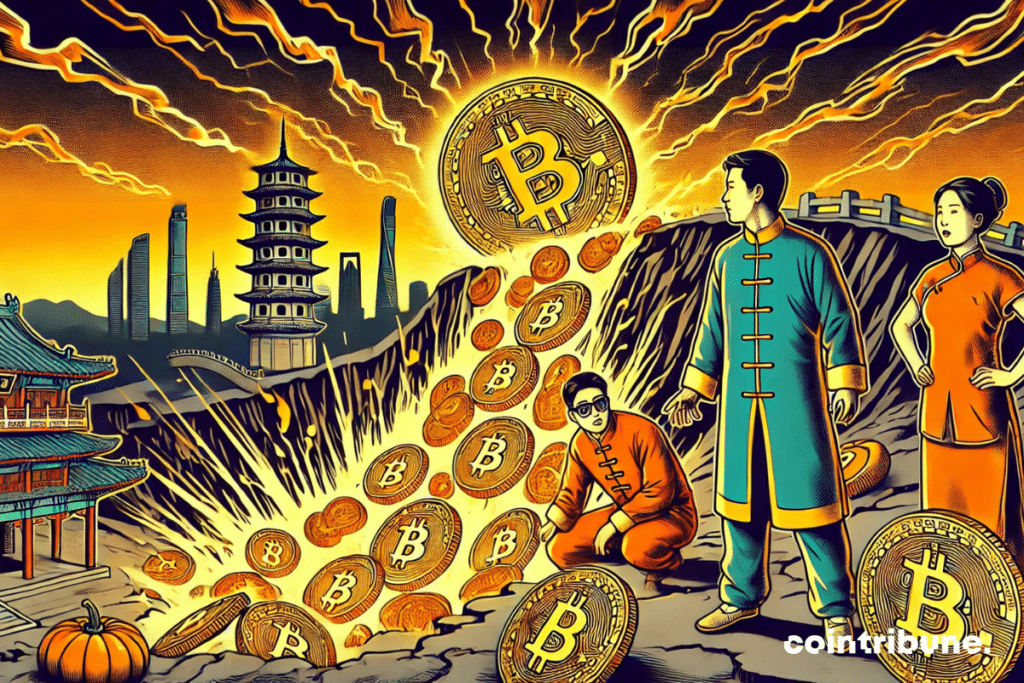13h05 ▪
5
min read ▪ by
The decisions of governments regarding cryptos often have major impacts on the markets, but the scale of recent actions by China marks a significant turning point. Beijing proceeded with the sale of 194,000 bitcoins, seized in 2019 during the dismantling of the PlusToken network, one of the largest Ponzi schemes in crypto history. Valued at nearly $19.7 billion, this massive liquidation raises questions about its economic implications and illustrates the growing complexity of the relationships between states and cryptos. As bitcoin continues to establish itself as a global store of value, this gesture by China underscores the strategic role that governments can play in the evolution of this rapidly changing ecosystem.


An Unprecedented Sale Orchestrated by Beijing
In 2019, Chinese authorities dismantled the PlusToken network, considered one of the largest Ponzi schemes in crypto history. This fraudulent system had defrauded billions of dollars from investors around the world, involving a massive amount of cryptos. Among the seized assets were 194,000 bitcoins, valued at several billion dollars, which were placed under the control of the Chinese state.
According to Ki Young Ju, CEO of CryptoQuant, these bitcoins were gradually sold on platforms like Huobi. “China has sold 194K bitcoins already, in my opinion,” he stated in a tweet published on January 23, 2025. However, Chinese authorities merely stated that the funds had been transferred to the national treasury, without providing further details on their final use. Such a massive sale operation, with a total estimated value of $19.7 billion, exerted significant pressure on the global bitcoin market. Despite this, the leading crypto managed to maintain relative stability, experiencing only a 3.7 % decline over a 24-hour period, reaching a level slightly below $105,000. This resilience is partly explained by the increasing intervention of institutional players, who play a stabilizing role in the face of such large-scale events.
The Implications of Such an Operation
Despite the relative stability of bitcoin, the massive sale orchestrated by China raises major concerns about the role of governments in managing seized cryptos. While some countries prefer transparent approaches, such as public auctions, Beijing’s strategy remains shrouded in opacity. “A censored regime that holds a censorship-resistant currency seems unlikely,” highlighted Ki Young Ju. He notes the paradoxes of Chinese policy concerning bitcoin. This contradiction reflects the tensions between the decentralized essence of cryptos and the centralized control exercised by some states.
In parallel, this operation has found a certain balance thanks to the involvement of major institutional investors. BlackRock, for instance, has acquired $600 million worth of bitcoin, demonstrating a growing interest from the traditional financial sector in cryptos. This trend helps stabilize the markets and strengthens the legitimacy of bitcoin as a store of value recognized by institutions. However, some observers warn of potential price pressures linked to global monetary decisions, such as possible interest rate hikes. Thus, these factors could amplify short-term volatility, even though institutional interest offers more optimistic long-term prospects.
This massive liquidation raises questions about the management of cryptos seized by states. While China has opted for a discreet and swift strategy, other nations may consider more transparent approaches, particularly through public auctions or collaborations with the crypto industry. In a context of increasingly strict regulations, the attitude of governments towards these assets will play a decisive role in their adoption and long-term stability. These decisions could shape the balance between state control and the rise of a market based on decentralization.
Maximize your Cointribune experience with our “Read to Earn” program! For every article you read, earn points and access exclusive rewards. Sign up now and start earning benefits.
Diplômé de Sciences Po Toulouse et titulaire d’une certification consultant blockchain délivrée par Alyra, j’ai rejoint l’aventure Cointribune en 2019.
Convaincu du potentiel de la blockchain pour transformer de nombreux secteurs de l’économie, j’ai pris l’engagement de sensibiliser et d’informer le grand public sur cet écosystème en constante évolution. Mon objectif est de permettre à chacun de mieux comprendre la blockchain et de saisir les opportunités qu’elle offre. Je m’efforce chaque jour de fournir une analyse objective de l’actualité, de décrypter les tendances du marché, de relayer les dernières innovations technologiques et de mettre en perspective les enjeux économiques et sociétaux de cette révolution en marche.
DISCLAIMER
The views, thoughts, and opinions expressed in this article belong solely to the author, and should not be taken as investment advice. Do your own research before taking any investment decisions.




